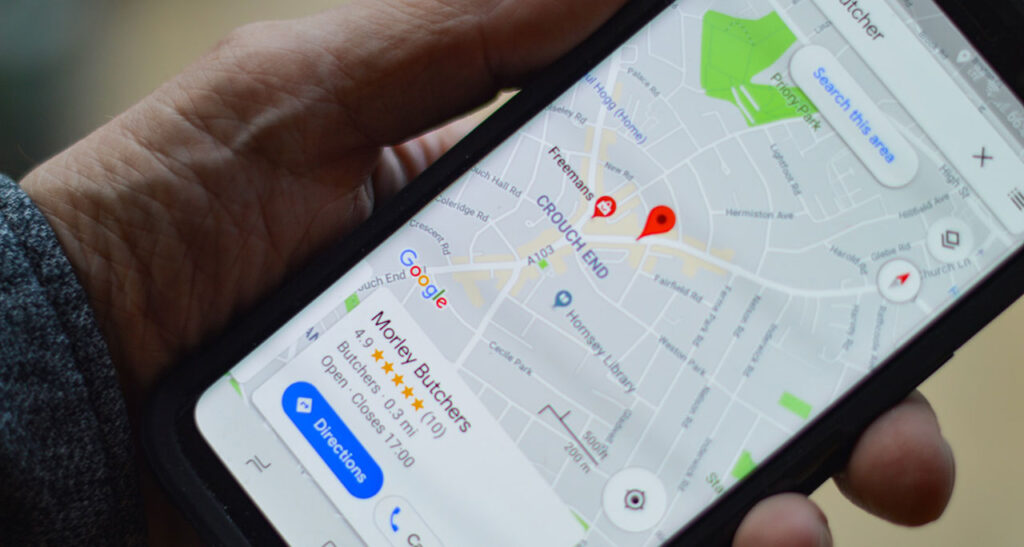In today’s digital age, optimizing your online presence is extremely important for the success of your local business. One of the key elements in achieving online visibility is through Google Maps marketing, which involves employing specific strategies to enhance the prominence of your Google Business Profile (GBP) in Google’s map results. Formerly known as Google My Business (GMB), GBP allows businesses to manage their listings on Google and provide essential information to potential customers.
This article aims to provide a comprehensive guide on optimizing GBP and highlights the importance of doing so for effective SEO. By following these strategies, businesses can increase their visibility in Google Maps, the local pack, and the Local Finder, reaching a wider audience and converting more leads into customers.
Create or Update Your Business Profile
The foundation of an effective Google Maps marketing strategy is a complete and detailed Business Profile. By providing accurate and comprehensive information about your business, you increase the chances of ranking higher in Google’s map results. The article emphasizes the importance of adding key details such as business name, category, address, service area, hours, phone number, website link, attributes, photos, and a business description. It also advises businesses to regularly update their profiles with the latest information to ensure accuracy.

Engage Locals Through Posts
GBP’s posts feature offers businesses the opportunity to engage with their local audience by making announcements, sharing updates, events, and offers. Businesses can leverage this feature to attract more customers and enhance their Google Maps marketing efforts.
Submit Questions and Answers
The Questions & Answers section in GBP provides businesses with an opportunity to provide additional information and assist potential customers. Businesses can respond to questions promptly and proactively add frequently asked questions to provide comprehensive information. This helps to establish credibility and demonstrate exceptional customer service.
Make Your Website SEO-Friendly
A website that is optimized for SEO can have a positive impact on your map rankings. There is a strong relationship between an SEO-friendly website and the visibility of your Business Profile. There are various local SEO techniques such as building links on local websites, publishing localized content, and addressing technical issues.

Track Your Performance
Once you have set up tracking, the Position Tracking tool will provide you with valuable insights into your keyword rankings. You can monitor the progress of your Business Profile in Google Maps, the local pack, and the Local Finder for the target keywords you’ve selected.
Keep an eye on your rankings and analyze any fluctuations or changes. If you notice that your Business Profile is not appearing as desired or if your rankings are dropping, it may be necessary to adjust your Google Maps marketing strategy.
Another crucial aspect of optimizing your Google Maps marketing is managing your online reputation. Customer reviews play a significant role in local search rankings. Encourage your customers to leave reviews on your Business Profile, as positive ratings and reviews can improve your local ranking. Respond promptly to reviews, both positive and negative, to show that you value customer feedback and are committed to providing excellent service.

In addition to Google reviews, pay attention to other online review platforms that may be relevant to your industry or location. Platforms such as Trustpilot, Tripadvisor, or G2 can also influence consumer decisions. If your target audience tends to use a particular platform, encourage customers to leave reviews there as well.
Remember to review and update your Google Business Profile regularly to ensure all information is accurate and up to date. Update your business hours, pricing, temporary closures, new products or services, and any other relevant details to provide accurate information to potential customers.
By implementing these Google Maps marketing tactics and optimizing your Google Business Profile, you can improve your visibility in local searches, reach more potential customers, and increase your chances of converting them into actual customers. Utilize the power of Google Maps and its integration with local search to enhance your SEO efforts and grow your business.
In addition to the strategies mentioned above, there are a few more techniques you can employ to maximize the impact of your Google Maps marketing efforts:
Leverage Google My Business Insights:
Google My Business provides valuable insights and data on how users interact with your Business Profile. Utilize these insights to understand customer behavior, track the performance of your posts, monitor customer actions (such as website visits, phone calls, and direction requests), and gain a deeper understanding of your audience. Use this information to refine your marketing strategy and tailor your content to meet the needs and preferences of your target customers.
Optimize for Voice Search:
With the increasing popularity of voice-activated assistants like Siri, Alexa, and Google Assistant, optimizing for voice search has become crucial. When users perform voice searches for local businesses, they often use natural language and longer, conversational queries. Incorporate long-tail keywords and phrases that align with how people speak and ask questions in your content. Focus on answering common customer queries in a concise and informative manner to increase your chances of appearing in voice search results.
Implement Schema Markup:
Schema markup is a code that helps search engines understand the content and context of your website better. By adding structured data markup to your website, you can provide search engines with specific details about your business, such as your address, phone number, business hours, customer reviews, and more. This information enhances the visibility and appearance of your Business Profile in search results, making it more informative and attractive to potential customers.

Utilize Local Citations and Directories:
Local citations refer to mentions of your business’s name, address, and phone number (NAP) on other websites, directories, and platforms. Ensure that your NAP information is consistent across all citations, including your Google My Business listing, online directories, social media profiles, and your website.
Consistency helps search engines associate your business with a specific location, boosting your local search rankings. Additionally, consider listing your business in relevant local directories and industry-specific platforms to improve your online visibility and attract more potential customers.
Engage with Local Influencers and Partners:
Collaborating with local influencers, bloggers, and complementary businesses can be a powerful strategy to increase your exposure and attract new customers. Seek partnerships with influencers who have a significant local following or reach out to local bloggers for guest posting opportunities. By tapping into their established audience and leveraging their influence, you can expand your reach and establish credibility within the local community.
Monitor and Respond to Google Questions:
Google Questions & Answers allows users to ask questions directly on your Business Profile. Regularly monitor and promptly respond to these inquiries to provide helpful and accurate information. By addressing potential customers’ questions and concerns, you can build trust and demonstrate your commitment to exceptional customer service. Encourage satisfied customers to answer questions as well, as their responses can positively influence potential customers.
Track and Analyze Competitor Performance:
Keep an eye on your competitors’ Google Maps marketing strategies and performance. Analyze their Business Profiles, customer reviews, posts, and overall online presence. Identify areas where you can differentiate yourself or learn from their successful tactics. Understanding your competitors’ strengths and weaknesses can provide insights and inspiration for improving your own Google Maps marketing strategy.
Geotagging also plays a crucial role in improving the rankings of your Google Business Profile (GBP) in local search results. Geotagging involves adding location-specific metadata to your online content, such as photos, videos, or other media. This metadata includes geographic coordinates, such as latitude and longitude, that help search engines understand the physical location associated with the content.
Here are some key reasons why geotagging is important for GBP rankings:
Local Relevance:
Geotagging signals to search engines that your business is relevant to a specific geographic area. When users search for businesses or services in a particular location, search engines like Google prioritize showing results that are relevant to that area. By geotagging your GBP content, you provide search engines with explicit signals about your business’s location, helping them connect your business to local search queries.
Enhanced Visibility:
Geotagging can improve the visibility of your GBP in local search results and Google Maps. When users search for businesses nearby or within a specific location, search engines consider the geotagged content as more relevant and show it prominently in the search results or on the map. This increased visibility can lead to higher click-through rates and more potential customers discovering your business.
Improved User Experience:
Geotagging enhances the user experience by providing accurate location information. When users search for businesses or directions, they expect accurate results that align with their current location or the area they are interested in. Geotagged content helps search engines deliver more precise and contextually relevant results, ensuring that users find the information they need quickly and easily.
Competitive Advantage:
Geotagging your GBP content can give you a competitive advantage in local search. When users compare multiple businesses within a specific area, search engines take into account the location signals provided by geotagged content. By optimizing your GBP with geotagged images, videos, and other relevant media, you increase your chances of standing out from competitors in local search results.
Local SEO Ranking Factors:
Geotagging aligns with several key local SEO ranking factors that search engines consider when determining the visibility of your GBP. Factors such as proximity to the searcher’s location, relevance to the search query, and prominence of your business are critical in local search rankings. Geotagging helps search engines understand these factors and can positively influence your GBP’s rankings.
To effectively utilize geotagging for GBP rankings, consider the following tips:
Geotag Images and Videos:
When capturing images or shooting videos of your business or its surroundings, ensure that the metadata contains accurate geolocation information. This can be done using tools or applications that allow you to embed geotags in your media files.
Embed Maps on Your Website:
Embedding Google Maps on your website and geotagging your physical address within the embedded map can reinforce the local relevance of your business to search engines. It helps establish a clear connection between your website, the physical location of your business, and your GBP.
Optimize Geotagged Content:
When uploading geotagged media to your GBP, optimize the accompanying titles, descriptions, and tags with relevant local keywords. This further enhances the association of your content with the targeted geographic area.
By combining these advanced tactics with the fundamental strategies mentioned earlier, you can create a robust and effective Google Maps marketing plan. Remember, optimizing your Google Business Profile and leveraging the power of local search can significantly impact your business’s visibility, attract more customers, and contribute to your overall growth and success. Stay proactive, adapt to changes in the local SEO landscape, and continually refine your approach to stay ahead of the competition.






